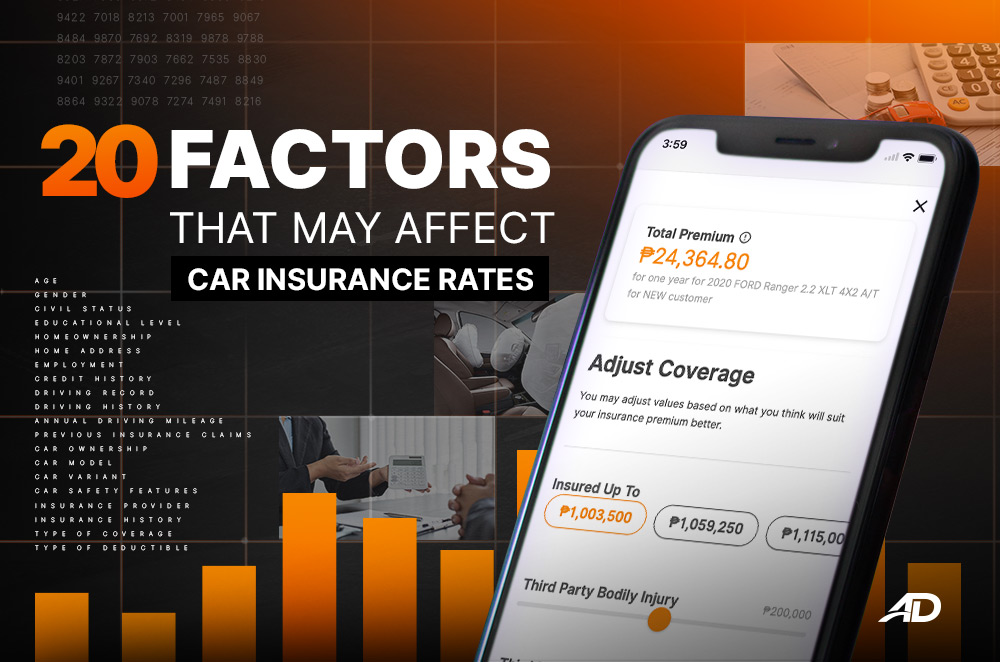
Car insurance rates may feel like a mystery at times. Some might enjoy favorable rates, while others might get slapped with high prices. Although exact methods differ between insurance providers, how they calculate rates isn't random. These companies consider a host of factors when determining the cost of a person's insurance policy, and it's a good practice to be familiar with the terms. In this article, we'll cover the key factors that may affect your car insurance rates.
1. Car ownership
Did you pay for your car in cash, or did you finance it? This question is important because fully paid cars are likely to have lower interest rates. Financed cars carry higher risks, so you may have to be asked to avail of more comprehensive insurance policies.
2. Car model
Not all cars are created equal, especially when it comes to insurance policies. Luxury cars and sports cars typically have higher insurance rates than regular crossovers or SUVs. This is due in large part to the presumed higher cost of repair of more expensive vehicles.
3. Car variant
Similarly, higher trim level cars often have more advanced features that make them costlier to repair. Features like driver-assist systems and 360-degree cameras are nice to have but can come back to bite you in terms of insurance rates.
4. Car safety features
As opposed to tech features, safety features can be surprisingly beneficial for insurance rates. Anything that can help you avoid accidents is likely to help with lower rates. Also, having a car that rates highly in the NCAP safety standards can be a good thing.
5. Insurance provider
Every insurance provider has different criteria when calculating insurance rates. It's a good practice to compare as many providers as you can before making a decision. With our comparison tool, you can get a free quote from several insurance companies quickly and easily.
6. Previous insurance claims
If you've made claims before, your insurance provider may raise your rates when you renew your policy. Although some companies offer accident forgiveness programs, including this on your policy may cost extra.
7. Insurance history
As each insurance company is different, you may be offered different rates if you switch to a new insurance provider. Policy details can also differ between companies, so make sure you study the pros and cons when looking for a new insurer.
8. Type of coverage
Availing of a minimum coverage policy is naturally cheaper than a comprehensive or full auto insurance policy. Full policies are more expensive but offer better protection against collisions and other accidents. In some cases, the provider may even replace the car.
9. Type of deductible
The deductible is the amount you pay when you make an insurance claim. If you get into an accident, your provider will use the deductible before forking over their share of the insurance loss. So, if you have a higher deductible, you may enjoy a lower premium and better rates.
10. Age
The younger you are, the more likely you are to have an accident. It makes some sense since most younger drivers tend to be less experienced. So, insurance premiums can be higher for those below the age of 25. Similarly, drivers get less dexterous with age, so drivers above 65 may have trouble availing good rates.
11. Gender
While it may seem odd, gender can also be a factor when calculating insurance rates. Whether you’re a male or female can determine how much you’ll be paying for auto insurance. Younger men and older women are likely to be stuck with higher premiums.
12. Civil status
Your marital status can play a role in insurance rates, with some providers giving higher rates for single, separated, or widowed drivers. If you're married, you may be in luck, as you may enjoy fairer rates.
13. Educational level
Insurance companies may favor drivers with college degrees. According to some providers, claims tend to be lower in educated demographics. However, using drivers' educational levels to determine insurance rates has been criticized in the past. So, insurers may be moving away from this practice.
14. Homeownership
Rates may be better if you own a home versus if you're renting or leasing. Providers may also give you discounts if you avail of bundles that combine car and home insurance.
15. Home address
Similar to homeownership, insurers can also give different rates for different residential areas. In densely packed cities, where accidents tend to be more common, rates may be higher. For this reason, drivers outside the city may enjoy more favorable insurance rates.
16. Employment
Your employment status is another factor that may affect insurance rates. Whether you're a regular employee, a freelancer, or a business owner can determine your premium. Certain high-risk occupations can also be given higher rates, like truck drivers and even doctors or lawyers.
17. Credit history
Whether you have loans and other liabilities can be a significant factor in determining your insurance rates. Providers may use your credit score to calculate your premium. Now, if you have a history of paying bills on time, this may work better for you in terms of rates.
18. Driving record
A driver with a spotless record may enjoy better insurance rates. Previous accidents, tickets, and citations show up on your driving record and could be used by insurance companies against you.
19. Driving history
How long you've had your driver's license can also impact rates. If you're a new driver, you may pay more than someone who has been driving for years and years.
20. Annual driving mileage
Similarly, how often you drive your car can be a factor as well. It's quite simple. The less you drive your car, the less likely it is for you to be involved in an accident. You may pay a higher premium if you drive your car more than the average, or somewhere north of a hundred thousand kilometers per year.
We've covered some of the most significant factors that may affect car insurance rates. While these are generally true for many companies, the factors above only serve as guidelines so you can be more informed. You should always consult with your provider to get the clearest picture of how insurance rates are calculated.
Latest Features
-
How to prepare your car for the Holidays / Featured Article
Here are our handy tips on how to keep you on the road and stress free this holiday season.
-
An all-electric future: The Porsche Macan Electric / Featured Article
Porsche’s Macan goes all-electric; it’s a new beast with an electrified heart, yet unmistakably Porsche in performance and spirit.
-
Which Kia should I buy? / Featured Article
We’re here to help you decide which Kia vehicle is best for you, whether it’s a sedan, crossover, or minivan.
Popular Articles
-
Electric Vehicles in the Philippines for under P1 million
Jerome Tresvalles · Aug 19, 2025
-
Top 3 Cars For Every Lifestyle—What Cars Are Right For You? | Behind a Desk
Caco Tirona · Apr 24, 2024
-
5 Tips to Maximize Fuel Efficiency
Jerome Tresvalles · Sep 09, 2024
-
Five driving habits that are draining your fuel tank
Jerome Tresvalles · Jun 24, 2025
-
Can engine braking harm your engine?
Jerome Tresvalles · Sep 11, 2025
-
Do electric cars even need maintenance?
Jerome Tresvalles · Oct 23, 2024
-
Best vehicles for an active outdoor lifestyle
Shaynah Miranda · Jul 25, 2024
-
How to drive different types of vehicle transmissions
May 23, 2024
-
5 easy ways to keep your car interior clean
Allysa Mae Zulueta · Nov 15, 2021
-
How to survive Metro Manila traffic
Earl Lee · Aug 16, 2022



